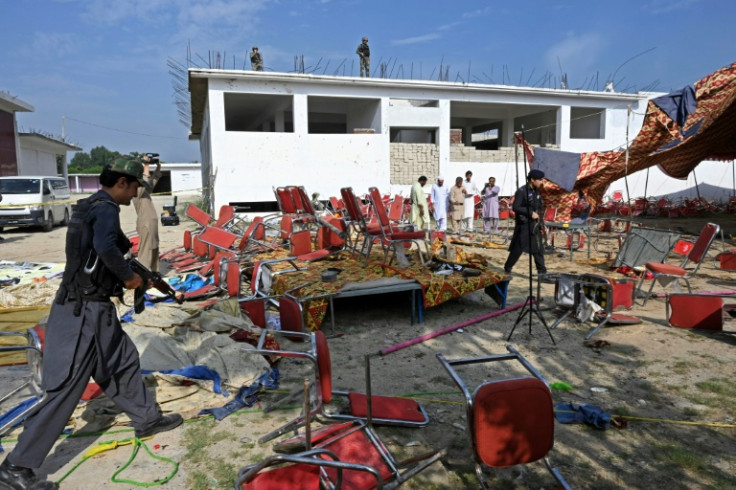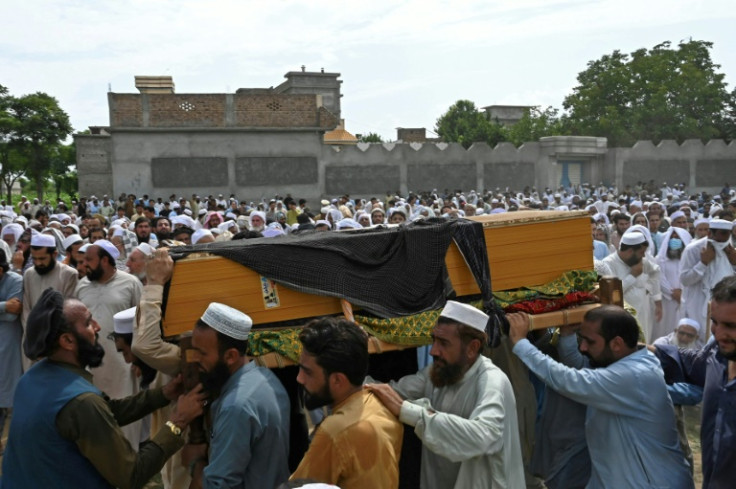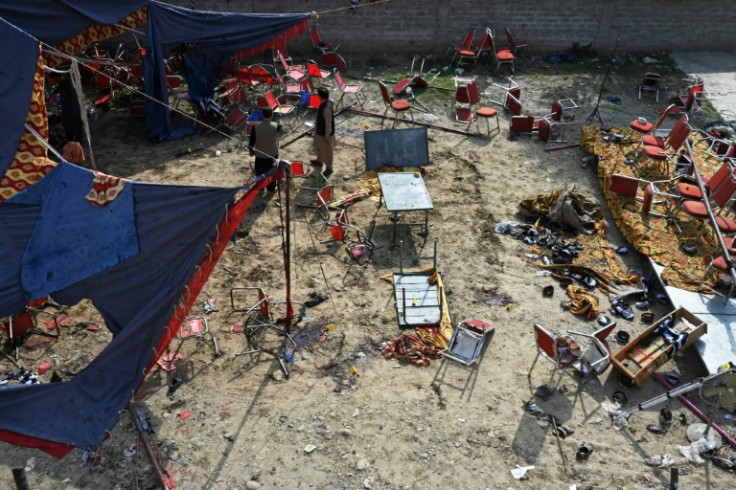Pakistan Police Comb Bomb Site After Deadly Blast

Pakistan police on Monday combed through the bloody wreckage of a suicide blast that killed at least 44 people at an Islamist party's political gathering ahead of elections due later this year.
Around 400 members of the Jamiat Ulema-e-Islam-F (JUI-F) party -- a key government coalition partner led by a firebrand cleric -- were waiting for speeches to begin when the attacker detonated his vest near the front stage.
"I was confronted with a devastating sight -- lifeless bodies scattered on the ground while people cried out for help," Fazal Aman, who was near the tent when the bomb went off, told AFP.
The attack occurred in the town of Khar in the northwestern Bajaur district, just 45 kilometres from the Afghan border, in an area where militancy has been rising since the Taliban took control of Kabul in 2021.
Pakistan's parliament is likely to be dissolved after it completes its term in the next two weeks, with national elections to be held by mid-November or earlier.
No group has claimed responsibility for the attack, but the Pakistani Taliban -- who operate in the area -- have denied being behind it.
The local chapter of the jihadist Islamic State group, who have not yet commented on the attack, have in the past targeted JUI-F rallies and leaders.
On Monday, blood-stained shoes and prayer caps littered the site, along with ball bearings and steel bolts from the suicide vest.
Pieces of human flesh could still be seen, blasted 30 metres (100 feet) from the stage where the bomber detonated his device.
Thousands of mourners attended the first funeral ceremonies, including for two young cousins aged 16 and 17.
"It was not easy for us to lift two coffins. This tragedy has shattered our family," said Najib Ullah, the brother of one of the boys.
"Our women are profoundly shocked and devastated. When I see the mothers of the victims, I find myself losing my own courage."
The blast has raised fears Pakistan could be in for a bloody election period following months of political chaos prompted by the ousting of Imran Khan as prime minister in April last year.
JUI-F's leader, cleric Fazl-ur-Rehman, started political life as a firebrand Islamist hardliner, and while his party continues to advocate for socially conservative policies, he has in recent years forged alliances with secular rivals.
He has operated in the past as a facilitator for talks between the government and Tehreek-e-Taliban Pakistan (TTP), a rival of the jihadist Islamic State group.
Last year, IS said it was behind attacks against religious scholars affiliated with JUI-F, which has a huge network of mosques and schools in the north and west of the country.
The jihadist group accuses the party of hypocrisy for being a religious party while supporting secular governments and the military.
While Rehman's party never musters more than a dozen or so seats in parliament, they can be crucial in any coalition and his ability to mobilise tens of thousands of religious school students allows him to punch above his weight.
"It is important to consider why workers of a religious inclined political party could have been subjected to such bestial violence," Dawn newspaper said in an editorial Monday.
"However ultra-conservative the JUI-F's worldview, the party has chosen to contest power and operate within the parameters set by the Constitution of Pakistan."
Pakistan has seen a sharp rise in militant attacks since the Afghan Taliban surged back to power in neighbouring Afghanistan in 2021.
In January, a suicide bomber linked to Pakistan's Taliban blew himself up in a mosque inside a police compound in the northwestern city of Peshawar, killing more than 80 officers.
The militant assaults have been focused in regions abutting Afghanistan, and Islamabad alleges some are being planned on Afghan soil -- a charge Kabul denies.
Pakistan was once plagued by almost daily bombings, but a major military clearance operation launched in 2014 in northwestern areas that were formerly Pakistani Taliban strongholds largely restored order.
The seven remote former tribal districts that border Afghanistan, of which Bajaur is one, were later brought into the legal and administrative mainstream after the passage of legislation in 2018.
Analysts say militants in the former tribal areas have become emboldened since the return of the Afghan Taliban.
The blast coincides with a visit to the country by a senior delegation of Chinese officials, including Vice Premier He Lifeng, who arrived in the capital Sunday evening.


© Copyright AFP 2024. All rights reserved.







